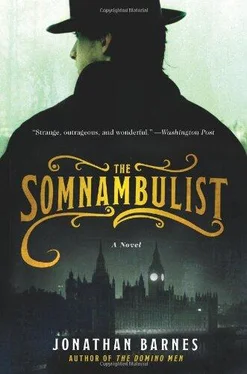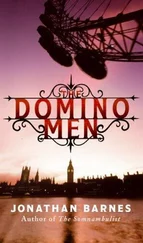Jonathan Barnes - The Somnambulist
Здесь есть возможность читать онлайн «Jonathan Barnes - The Somnambulist» весь текст электронной книги совершенно бесплатно (целиком полную версию без сокращений). В некоторых случаях можно слушать аудио, скачать через торрент в формате fb2 и присутствует краткое содержание. Жанр: Иронический детектив, Исторический детектив, на английском языке. Описание произведения, (предисловие) а так же отзывы посетителей доступны на портале библиотеки ЛибКат.
- Название:The Somnambulist
- Автор:
- Жанр:
- Год:неизвестен
- ISBN:нет данных
- Рейтинг книги:5 / 5. Голосов: 1
-
Избранное:Добавить в избранное
- Отзывы:
-
Ваша оценка:
- 100
- 1
- 2
- 3
- 4
- 5
The Somnambulist: краткое содержание, описание и аннотация
Предлагаем к чтению аннотацию, описание, краткое содержание или предисловие (зависит от того, что написал сам автор книги «The Somnambulist»). Если вы не нашли необходимую информацию о книге — напишите в комментариях, мы постараемся отыскать её.
The Somnambulist — читать онлайн бесплатно полную книгу (весь текст) целиком
Ниже представлен текст книги, разбитый по страницам. Система сохранения места последней прочитанной страницы, позволяет с удобством читать онлайн бесплатно книгу «The Somnambulist», без необходимости каждый раз заново искать на чём Вы остановились. Поставьте закладку, и сможете в любой момент перейти на страницу, на которой закончили чтение.
Интервал:
Закладка:
The conjuror bought his friend a pint of milk and asked, as politely as he could, why he had disappeared. The Somnambulist took out his chalkboard.
SAW SPEIGHT
“Speight?” Merryweather peered nosily over Moon’s shoulder. “The tramp?”
The giant nodded.
“How was he?” asked Moon, slightly bemused.
SUIT
“He was wearing a suit?” Moon asked carefully.
SMART
“Are you sure?”
The Somnambulist nodded, evidently frustrated.
BANK
“He was outside a bank?” the inspector offered.
The Somnambulist shook his head vigorously.
“He works in a bank?” Moon asked, incredulous.
The Somnambulist nodded gratefully.
Merryweather snorted. “Preposterous.”
CAMOUFLAGE
“Camouflage?” Moon was about to ask the meaning of this when the faint cry of a paper boy floated in from outside.
When he heard the headline, Moon dashed out of the pub and into the street.
“Horrible Murder in Newgate!” the boy shouted again. “The Fiend Is Dead!”
Moon seized a paper and riffled furiously through it. When his friends ran out to join him, the found him staring dully down at the newsprint, tears edging the corners of his eyes. Discreetly, they kept their distance. Moon let the paper fall from his hands and drop onto the street, where it was trampled underfoot, sodden, torn and kicked away, another piece of city flotsam. Suddenly, acutely aware that forces of coincidence were marshaling themselves against him, Moon stood alone and silent. Then he surprised himself by laughing. There was no humor in the sound, no genuine mirth, but in the face of all that had happened it seemed to him by far the most logical reaction. To the impartial observer, of course, it may have appeared more like the act of a man whose sanity, like desert earth baked dry, has begun at long last to splinter and to crack.
Through it all, the old man sleeps beneath the city.
Some conscious part of him may be aware that things are changing in the streets above, that events are progressing toward their inevitable crisis. Perhaps he knows that he will soon have to stir from his slumber and face the waking world. But for now he remains mired in dreams.
First, he is a young man again, in the company of friends, before any of them had been touched by life’s realities. Southey is with him — brave, dear Southey — at a time before his betrayal and their feuds. Their talk is earnest, too solemn, perhaps, but typical of the way they were.
The old man sighs and stirs uncomfortably in his sleep, remembering happier times.
The young men talk of their hopes and ambitions, of the great experiment. Southey speaks loftily of a brotherhood, of their plans to escape and perfect themselves.
The dreamer sees himself talking fervently, fire blazing in his eyes, of poetry and metaphysics and the need for a better world.
Susquehanna . The word surfaces without warning. It means nothing to him but he enjoys the sound of it, its pleasing rhythm. He repeats it to himself. Susquehanna .
Then Edith emerges beside Southey, interrupting them with cake and wine, and the old man sees that the chasm between them is already widening. Sara brushes up against him and he is distracted. The dream shifts again.
He is old now, his friendships withered like fruit on a rotten vine, the clear vision of his youth fogged and obscured by the compromises of age. He is a different man, gripped in the coils of penury and afflicted by an evil longing. Naked to the waist, his breeches pulled down below his knees, he sits straining over a privy, clenched and groaning, sick in the knowledge that he has afflicted this poisoning, this acrimony of the bowels, upon himself, that he is to blame for his condition. “My body is deranged,” he writes — his madness the product of a fondness for medicine, a folly, a treacherous lover in whose thrall he has been too long held tight. He mutters to himself as, humiliated, he sits and heaves and pushes.
At last, he returns to the garret room in Highgate, to Gillman and the boy. Ned is there, not so young now. He holds out his hand. Feverish and dying, the old man takes it. He tells Gillman to leave them, and the doctor, respectful of his patient’s whims, obeys.
Ned seems fearless of him now that death stares back through the old man’s eyes. He wants to tell the boy what he means to him, how the boy has brought him to life again and rekindled his dreams. Surprisingly, for one so voluble in life, he cannot find the words. He stutters awhile, then contents himself with clutching the proffered hand, but he is sure nonetheless that the boy — this special, chosen boy — knows . He has bequeathed to him a legacy. Ned is to be his successor, his champion. He squeezes his hand, blinks back a few final tears.
Gasping in his sleep, shuffling uncomfortably on his iron cot, the dreamer knows the end is near.
Perhaps, if he were aware of the passing of time, the exact chronology of his incarceration, he might care to know precisely how long he has left before he wakes.
But I have faith in you. You’ll have worked it out by now, I’m sure.
Four days. Four days before the dream ends, the old man wakes and the city falls.
Chapter 14
Professional pavement artists are a modern phenomenon. In London, they sprang into being only as the guardians of the city’s streets and thoroughfares began to favor the economy of tarmacadam over the quaint impracticality of cobblestones. By the time of Moon’s last case, the pitted, pot-holed character of the old city had given way to the flawless asphalt of the new century. Accordingly, the city had seen an unwelcome increase in vagrants and down-at- heel needies plying their trade as roadside artists. One especially pernicious breed had acquired the name screever , a title given to those alms-seekers little better than beggars, the type that had they not possessed the barest modicum of artistic ability would doubtless have been selling matches or accosting passers-by with an outstretched cap and a forlorn look.
The day after Barabbas died, Mr. Dedlock was thrusting his way through the crowds which, quite without reason, had chosen this morning in particular to pack the streets of Limestone and block his path, all of them pushing and shoving and struggling like a Far Eastern football team jostling for drinks at the after-match bar. This must be a religious festival, he thought, some heathen public holiday or other which has resulted in this thoughtless and distracting inconvenience. By the time he reached the familiar shop front, he had to pause, sweaty and wheezing, to catch his breath. His triumphs on the rugby pitch were years behind him; that world belonged now to fitter, leaner, younger men.
A screever sat a few paces from the butcher’s door. Unkempt to as almost grotesque degree, his artwork was chalked half-heartedly on the pavement before him. Dedlock strode past, determined not to give the man the merest flicker of acknowledgment, but as he glanced down at the screever’s handiwork, something stared back — a word which made him stop short in shock.
Dedlock
Wrinkling his nose at the smell, the gentleman in question stared down at the screever. “Do I know you?”
“Danger,” the beggar hissed. “Danger.”
“Danger? What danger?”
“Danger.”
“Dedlock gave him a haughty stare. “You’re drunk.”
“Don’t you know me, sir?”
Dedlock snorted dismissively and was about to walk away when something about the creature drew his eye, something uncomfortably familiar. He peered closer. “Grischenko? Is that you?”
The screever nodded, a little sheepishly.
“What the devil are you doing here?”
“Danger,” he repeated solemnly. “Danger.”
Читать дальшеИнтервал:
Закладка:
Похожие книги на «The Somnambulist»
Представляем Вашему вниманию похожие книги на «The Somnambulist» списком для выбора. Мы отобрали схожую по названию и смыслу литературу в надежде предоставить читателям больше вариантов отыскать новые, интересные, ещё непрочитанные произведения.
Обсуждение, отзывы о книге «The Somnambulist» и просто собственные мнения читателей. Оставьте ваши комментарии, напишите, что Вы думаете о произведении, его смысле или главных героях. Укажите что конкретно понравилось, а что нет, и почему Вы так считаете.












